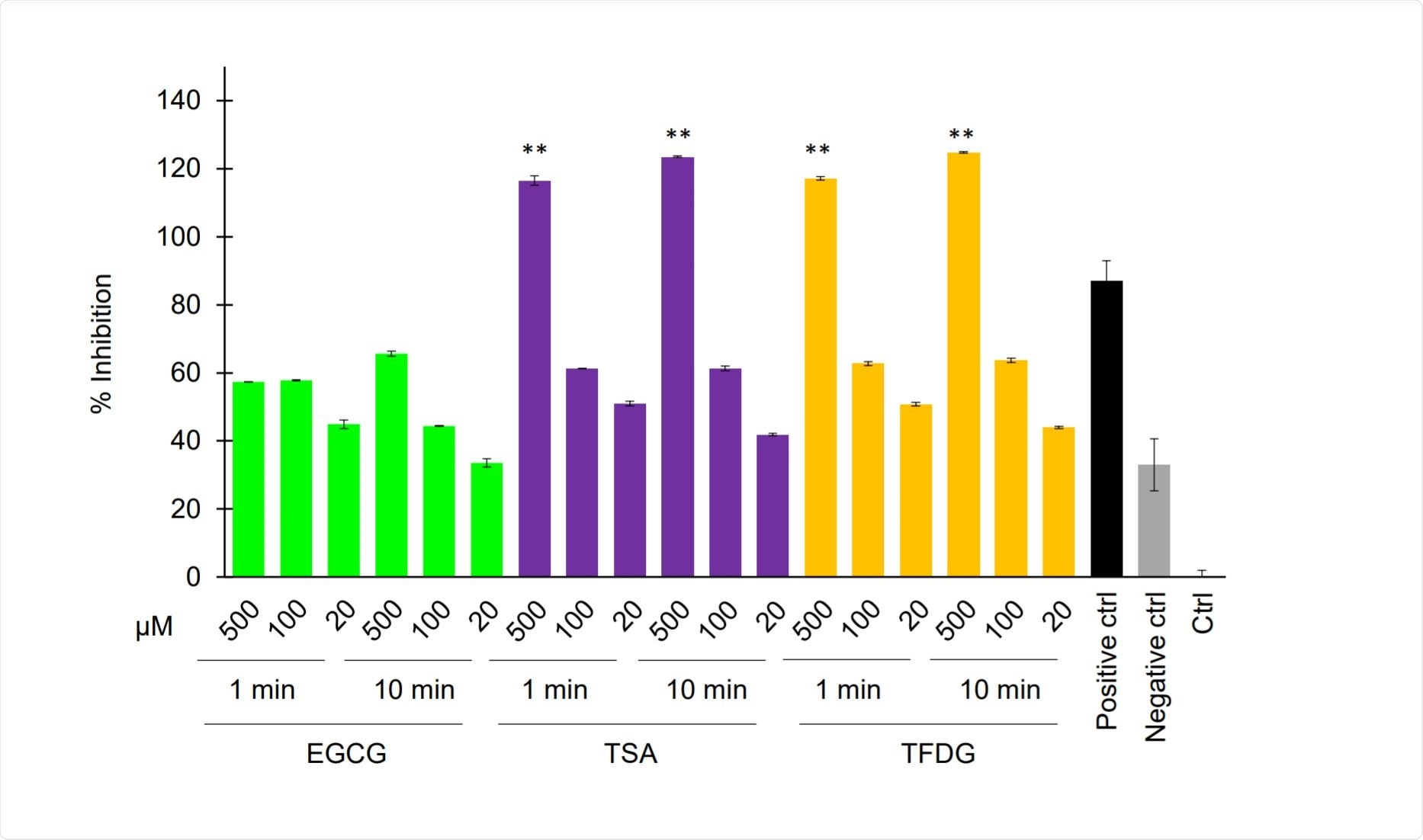As of December 7, 2020, more than 66 million confirmed cases of COVID-19, including 1.5 million deaths, have been reported to the World Health Organization (WHO). Although the majority of COVID-19 patients remain asymptomatic or mildly symptomatic, the risk of developing a severe illness is still high among susceptible individuals.
Currently, many repurposed antiviral drugs along with corticosteroids are being routinely used to treat severe COVID-19 patients, and many of these drugs are showing promising outcomes.
Given the high safety and tolerability profiles of several plant compounds, many studies have been conducted to evaluate the effectiveness of these in treating SARS-CoV-2. Epigallocatechin gallate (EGCG) is one such polyphenolic compound found in green tea that has shown therapeutic benefits in cardiovascular, metabolic, neurological, and infectious diseases and cancer.
Oxidation of EGCG gives rise to several multimers, such as theasinensin A (TSA) and theaflavin 3, 3’-di-gallate (TFDG), which are different types of polyphenolic compounds found in black tea and oolong tea.
Current study design
In the current study, scientists aimed to investigate the effects of various tea compounds in eliminating SARS-CoV-2. Specifically, they pretreated SARS-CoV-2 with various tea extracts and purified tea catechins, catechin derivatives, and theaflavins to check the antiviral efficacy of these compounds. They used VeroE6 cells overexpressing TMPRSS2 as an in vitro model to conduct the experiments.
Important observations
The scientists observed that the treatment of SARS-CoV-2 with black, green, and oolong tea extracts caused a significant reduction in viral titer, which eventually reduced below the detectable range. Among various tea extracts, the black tea extract showed the highest effect. Moreover, the tea extracts strongly inactivated SARS-CoV-2 and prevented it from damaging VeroE6 cells.
Bioactive tea compounds
The scientists tested various tea catechins and theaflavins to identify potential antiviral compounds. The study findings revealed that EGCG, TSA, and TFDG strongly inactivated the virus, with TSA and TFDG exhibiting comparatively higher antiviral activity than EGCG. Specifically, TSA and TFDG at 500 µM and 100 µM doses, respectively, reduced the viral titer below the detectable limit.
In addition, the scientists observed that SARS-CoV-2 pretreated with TSA or TFDG could not reduce the viability of VeroE6 cells. To get a comparable level of protection, a higher concentration of EGCG was required.
In a separate set of experiments, they pretreated VeroE6 cells with EGCG, TSA, and TFDG and subsequently infected the cells with untreated SARS-CoV-2. Interestingly, they observed that the risk of getting infection was equally high for both pretreated and untreated cells. These findings indicate that tested tea compounds are effective in directly inactivating the virus, but may not act directly on the cells to prevent viral entry.
For further clarification, they assessed the viral RNA load in cells that were infected with EGCG-, TSA-, or TFDG-pretreated virus. The findings revealed that the tea compounds, especially TSA and TFDG, significantly reduced the replication and release of SARS-CoV-2.
Mode of action
To investigate the mode of action of active tea compounds, they checked the interaction between recombinant angiotensin-converting enzyme 2 (ACE2) and receptor-binding domain (RBD) of the viral spike protein in presence of EGCG, TSA, and TFDG. The findings revealed that TSA and TFDG strongly and EGCG moderately inhibited the interaction.

TSA and TFDG interfered with the interaction between ACE2 and RBD. Image Credit:https://www.biorxiv.org/content/10.1101/2020.12.04.412098v1.full.pdf
Study significance
The current study identifies potential bioactive tea compounds with antiviral activity against SARS-CoV-2. The anti-cancer, anti-inflammatory, antioxidant, and anti-microbial efficacies of these compounds has been well documented in the literature. Although consumption of a few cups of tea is not sufficient to achieve the effective antiviral dose of these compounds in the blood, the scientists believe that oral intake of EGCG, TSA, and TFDG can ensure protection against SARS-CoV-2 in the oral cavity and gastrointestinal tract.